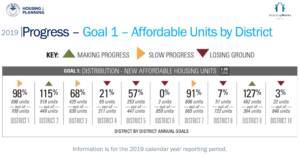Planning commissioners: We’re not building enough affordable housing
Thursday, February 11, 2021 by
Jonathan Lee Planning commissioners expressed concern this week about the lack of progress made toward the city’s affordable housing production goals. The discussion followed a presentation of the recently released Strategic Housing Blueprint Scorecard, which shows how much affordable housing has been created in relation to the blueprint‘s annual targets.
“Yes, we’re building more affordable housing,” said Commissioner Jeffrey Thompson, “but if we’re not hitting that number at 100 percent of the target, there are going to be even more people who are struggling to find affordable housing in Austin, or worse, they’re not going to be in Austin.”
Multiple categories fell short of the annual targets. Only 118 new income-restricted units for families making less than 30 percent MFI were created last year out of a goal of 2,000. Units at 80 percent MFI fell similarly short. Affordable housing production was well under the target in all but two Council districts.
The program, which began in 2017, aims to help create 135,000 new homes by 2028, including 60,000 units affordable to those making 80 percent or less of area MFI.

The Housing and Planning Department’s Mandy De Mayo, who presented the scorecard, gave two reasons why affordable housing creation lagged in some areas: the program’s goals are “extremely ambitious and aggressive,” she said, and the annual numbers don’t show projects in the early stages of development.
De Mayo expects much better results in the next two years, with many more affordable units in the works. “I’m forever the optimist,” she said. “And I do recognize that a lot of our investments take time to come to fruition.”
Commissioner James Shieh worried that Austin’s growth renders the blueprint’s goals inadequate. “At what point are we gonna have to look at our housing blueprint and say, all these goals that we had were based upon a different trajectory.”
De Mayo said that the goals set in 2017 took into account Austin’s expected growth, with an eye toward helping not just people already living in Austin, but those who would like to move to the city.
Commissioner Joao Paulo Connolly pointed out that most of the affordable housing built so far has been east of Interstate 35. “The districts that really are doing their part, or going above and beyond doing their part in terms of taking on the affordable housing stock for our city, continue to be the districts that are historically the people-of-color districts, the working-class districts with the lowest incomes in the city.”
The commissioners wondered how to incentivize more affordable housing without a comprehensive Land Development Code rewrite, since that effort remains stuck in litigation. They mentioned expanding the density bonus program to areas beyond downtown, creating more Imagine Austin corridors in West Austin, as well as interim LDC fixes while the lawsuit moves through the courts.
“We can’t do a comprehensive rewrite and violate protest rights and notification,” Commissioner Carmen Llanes Pulido said, “but we can get stuff voted on with nine votes and could potentially calibrate tools.”
De Mayo said that the Housing and Planning Department had made many recommendations as part of the rewrite, but action on those recommendations are “stymied” for now. She did say that some “administrative” changes are in line for the city’s SMART housing program and that density bonuses need to be “recalibrated and looked at more holistically.”
The 2020 scorecard will be released soon, De Mayo said, and both the 2020 and 2021 scorecards should “have a lot of green arrows making progress.”
The Austin Monitor’s work is made possible by donations from the community. Though our reporting covers donors from time to time, we are careful to keep business and editorial efforts separate while maintaining transparency. A complete list of donors is available here, and our code of ethics is explained here.
You're a community leader
And we’re honored you look to us for serious, in-depth news. You know a strong community needs local and dedicated watchdog reporting. We’re here for you and that won’t change. Now will you take the powerful next step and support our nonprofit news organization?




